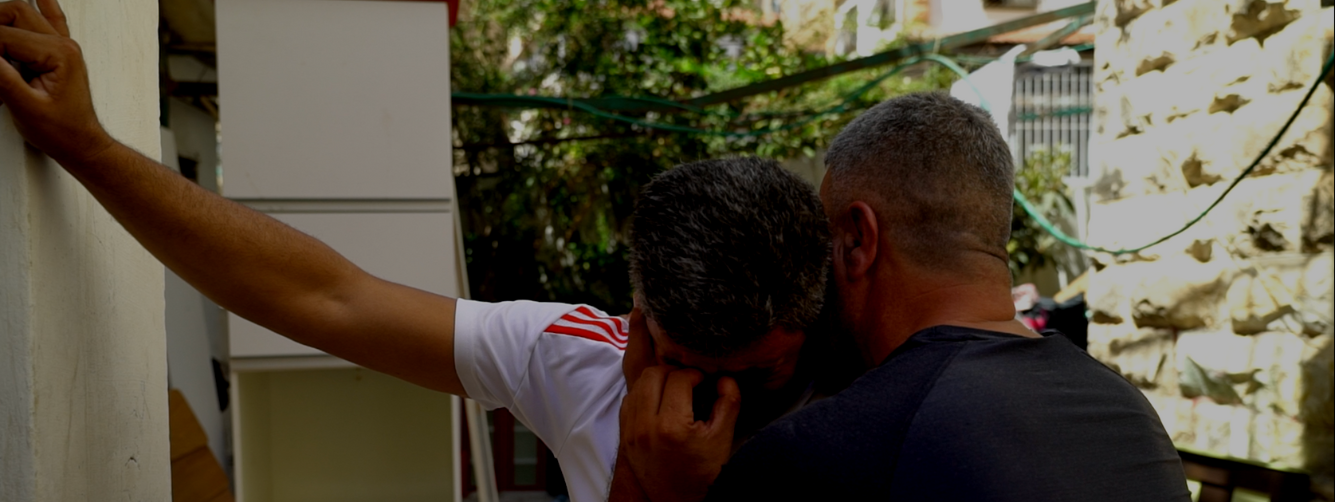
“Silent transfer” is a term used to express an Israeli occupation policy aimed at vacating Jerusalem of its indigenous inhabitants, through creating an oppressive and coercive environment of harsh living conditions and economic circumstances. Through long-term strategies such as this one, the economic and living conditions of Palestinian Jerusalemites have gradually but steadily worsened as life’s burdens continue to increase. Israel imposes hefty taxes and marginalizes and isolates Palestinian neighborhoods in overcrowded areas to realize this goal. In these areas, urban expansion is “illegal” without a permit, which are almost impossible for Palestinians to obtain. If and when Palestinians build anyway, even if one room, they are most often slapped with a demolition order, executed either by the illegal Israeli Jerusalem municipality or they are forced to carry out the painful task on their own.
Thus, Palestinians are left with two options: the first is find less expensive living spaces in neighborhoods such as Kufr Aqab, which are already highly overcrowded and unregulated, and the second is to build without a permit to meet the needs of their naturally growing families.
Devouring Jerusalem
Israeli occupation authorities devised the so-called “Greater Jerusalem” project years ago, aimed at replacing Palestinian Jerusalemites with Israeli settlers through various means. This began with the confiscation of two-thirds of the land in Jerusalem, estimated at 24,500 dunams, following the establishment of Israel on historical Palestine in 1948, based on the “Israeli Planning and Building Law” of 1965, two years before the 1967 occupation. On this land, it built 11 neighborhoods, earmarked exclusively for new Israeli settlers. Occupation authorities also decided to effectively cancel all Jordanian structural plans in these areas, in order to make way for its settlement enterprise, including in expansive areas designated as “landscape lands” where building was prohibited.
After several Israeli alterations to structural plans, the Arab Studies Mapping Department showed how the area of land allocated for Palestinian construction had been reduced to just 13% of the overall urban space. This is despite the fact that Palestinians comprise approximately 40% of the city’s population. Data in 2014 from the Land Research Center puts this number closer to 30%. Likewise, data from the Jerusalem Institute for Policy said the population density in 2015 in Palestinian neighborhoods in occupied East Jerusalem had almost reached double the density of settlement neighborhoods in the city, at an average of 1.9 individuals per room. Meanwhile, the population density in West Jerusalem was around 8,300 persons per km2 and 9,000 settlers km2 in East Jerusalem settlements. In Palestinian neighborhoods, the number reaches 13,500 people per km2, according to settlement affairs expert, Khalil Tufakji.
Occupation authorities not only altered structural plans, but found even more “legal” ways to devour additional Palestinian land in East Jerusalem by declaring them “national parks”. The mere declaration prevents construction in vast areas of land, fully and permanently. Until today, there are seven of these parks in occupied East Jerusalem alone, the most insidious being the 1,100-dunam park on the peripheries of the Old City, in Silwan’s Wadi Helwa neighborhood. This park extends all the way to Wadi Joz to the east and along the area from Jaffa, Damascus and Herod’s Gates, to the northeastern corner of the Yousifiyeh cemetery.
Parks to besiege Jerusalemites:
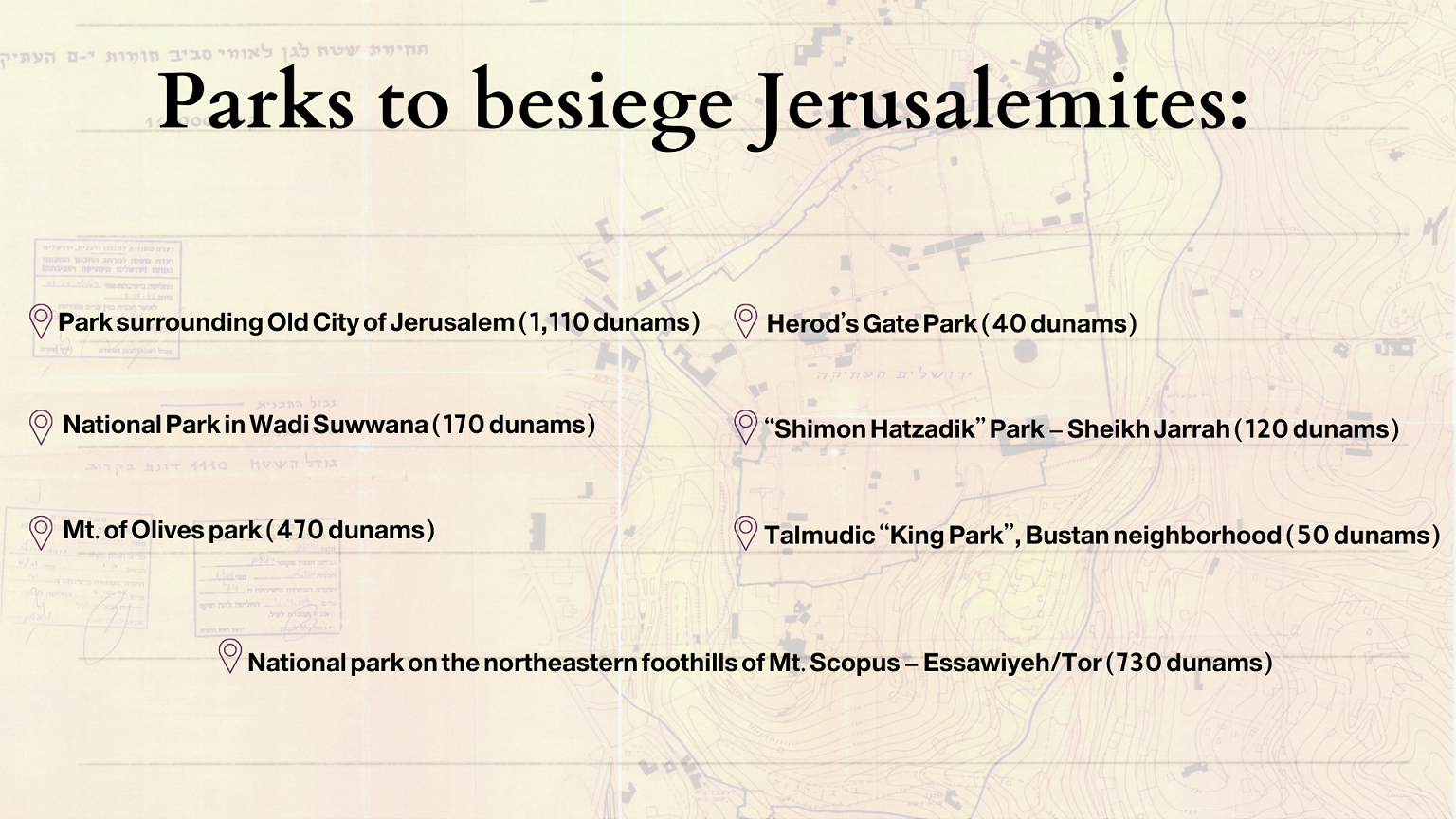
These Israeli plans correspond with their disregard and failure to formulate detailed construction maps for Palestinian neighborhoods. It should be noted that building permits cannot be issued without these maps, which results in an acute shortage of residential and public buildings and infrastructure facilities in these areas, including roads, sidewalks and water networks. This forces Palestinians to live in highly populated and congested areas, to move to areas far from the center of Jerusalem, or to build or expand their homes without licenses.
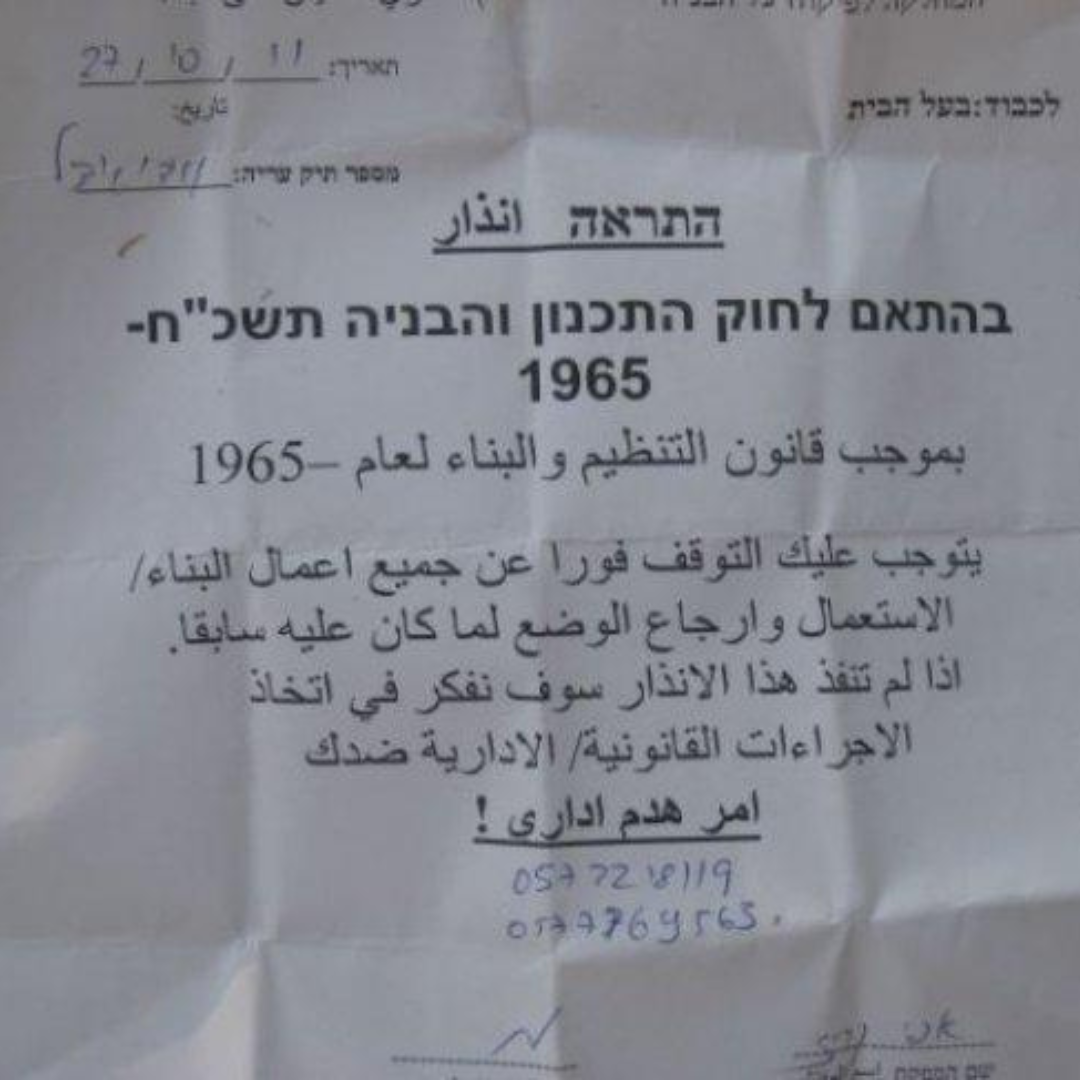
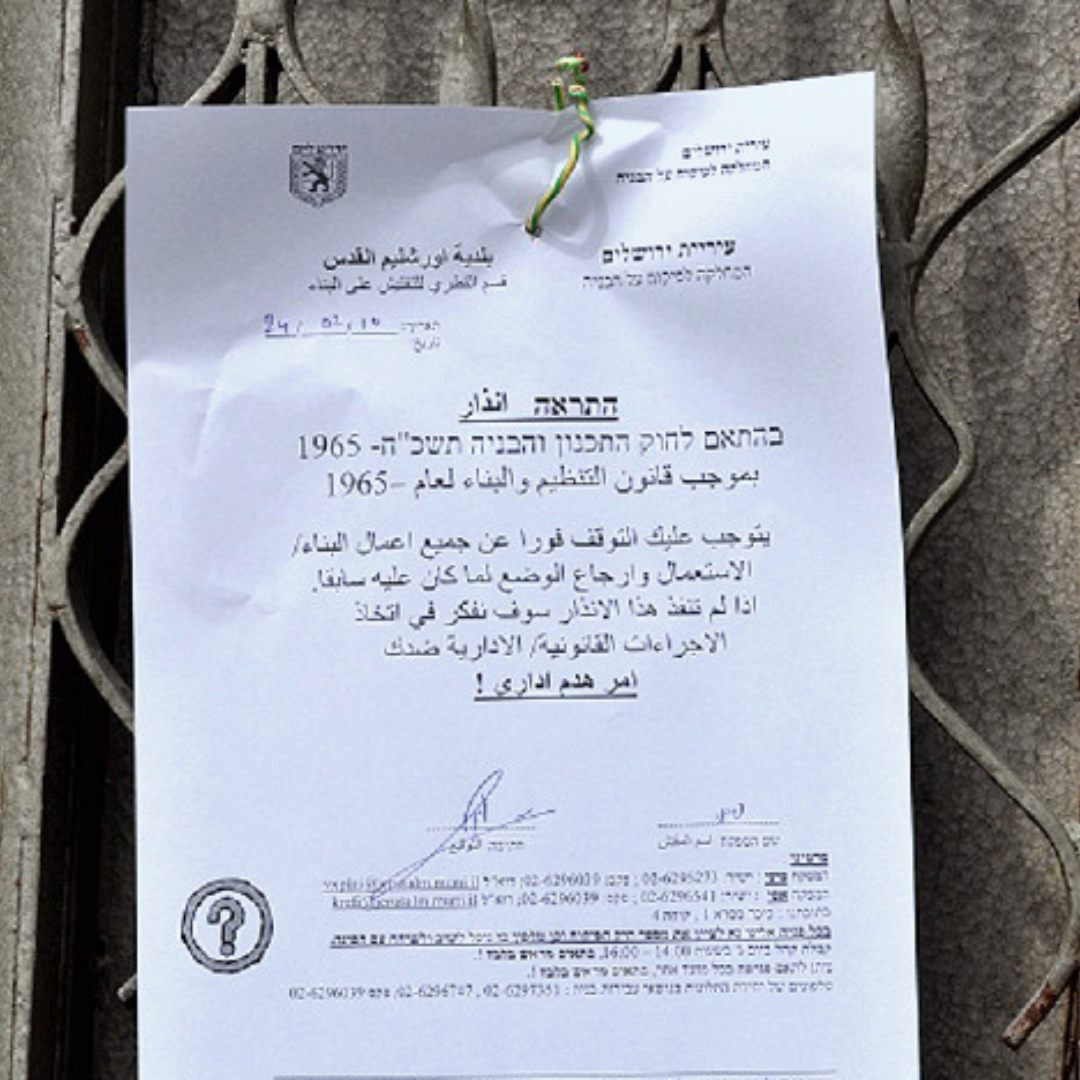
Self demolitions
“Your home was built without a permit, which means it is illegal. You must demolish or remove it as soon as possible and also photograph the building after it is demolished and send it to the inspections department of the municipality’s planning and building committee” –
Israeli occupation forces threaten owners of homes at risk of demolition, with hefty fines in lieu of the cost of an Israeli municipality demolition. This is over and above the money they spend in an attempt to obtain building permits for any structure or additional room. Such a situation puts Palestinian Jerusalemites in an impossible position, caught between the rock of having to demolish their own home or the hard place of footing the hefty municipality bill. In either case, their house ends up in a pile of rubble. The only small silver-lining to demolishing their own homes is they ensure that their personal belongings and furniture are saved.
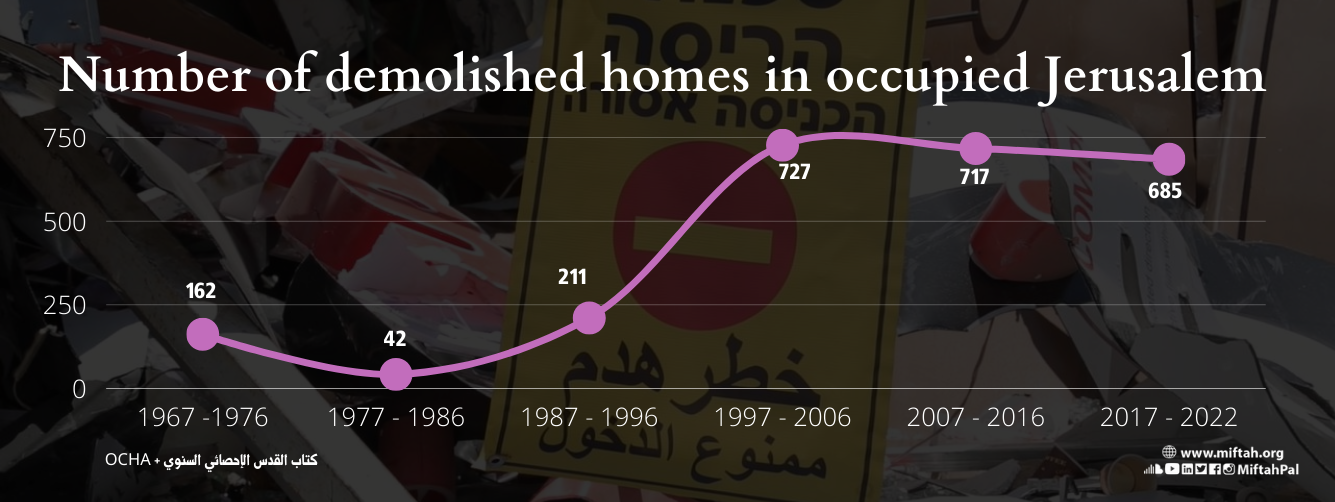
The Abu Ramouz family
The Abu Ramouz family has been in a long and arduous battle with the illegal Israeli Jerusalem municipality. Last year, it even succeeded in securing a stay on the demolition of their home, but the battle ultimately ended in a final court ruling: the family must tear down their home, where they have lived for over seven years. If they chose not to heed to order, the family would find itself under the weight of heavy fines and fees, including if they failed to remove the rubble of their demolished home.
UN-OCHA statistics maintain that 1,201 structures, mostly homes in occupied Jerusalem, were demolished, displacing 27,411 people and partially impacting another 5,566. The agency’s statistics also show that 75% of the victims were women, girls and children.
Women shoulder the lion’s share of responsibility in restoring stability to the family in cases of demolition. This is because for women, loss is about social and not only material value. Women are the family members who often forge the strongest bonds inside the home.
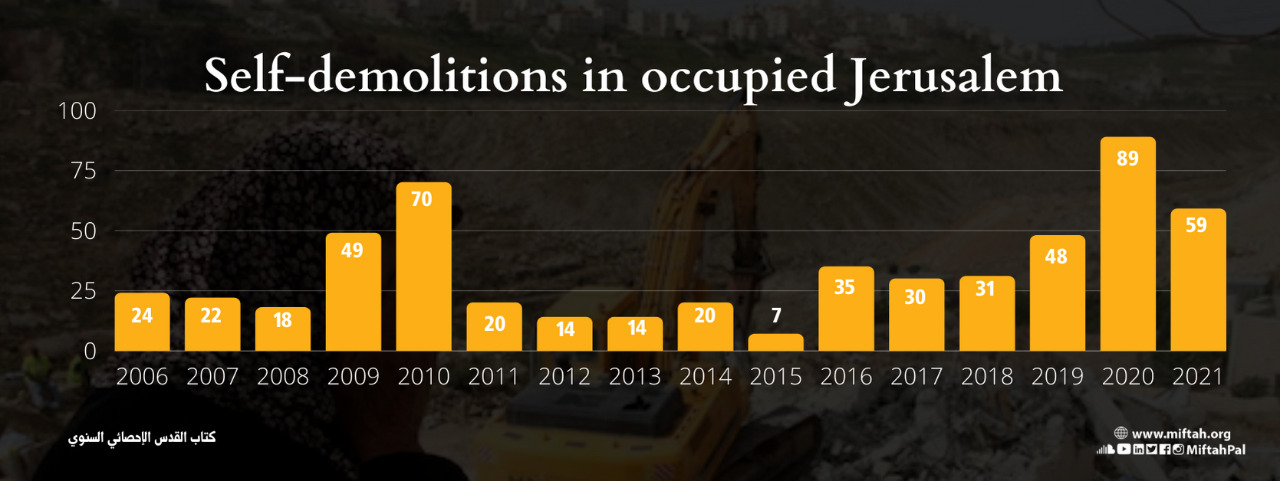
Self demolitions in occupied Jerusalem
Case studies have shown that forced displacement and home demolitions result in multiple human rights violations, particularly for women and children. These include the right to education, bearing the burdens of the household and health care, all byproducts of the loss of privacy and a safe space. In addition, the tremendous amount of pressure on the family negatively affects their relationships, which makes mothers feel that their emotional, material and authoritative roles have been undermined.
The right to housing is a fundamental right
Article 25 of the Universal Declaration of Human Rights and Article 11 of the 1966 International Covenant on Economic, Social and Cultural Rights both state that every person has the right to an adequate standard of living for himself and his family, including adequate food, clothing and housing, and to the continuous improvement of living conditions. Home demolitions are a grave violation of this right.
The policy of demolishing homes falls within the category of grave violations and an arbitrary measure that could unrightfully result in the destruction and confiscation of ownership, according to the 1949 Fourth Geneva Convention on the protection of civilians in times of war. Article 53 of the Convention: “Prohibits any destruction by the Occupying Power of real or personal property belonging individually or collectively to private persons, or to the State, or to other public authorities, or to social or cooperative organizations, is prohibited, except where such destruction is rendered absolutely necessary by military operations.” Also, Article 33 stipulates: “No protected person may be punished for an offence he or she has not personally committed. Collective penalties and likewise all measures of intimidation or of terrorism are prohibited. Pillage is prohibited.”
Home demolitions as a war crime
International criminal law considers wide-scale home demolitions illegitimate and in violation of international law. According to Article 8.2 of the International Criminal Court Rome Statute: “Extensive destruction and appropriation of property, not justified by military necessity and carried out unlawfully and wantonly” is considered a war crime.


